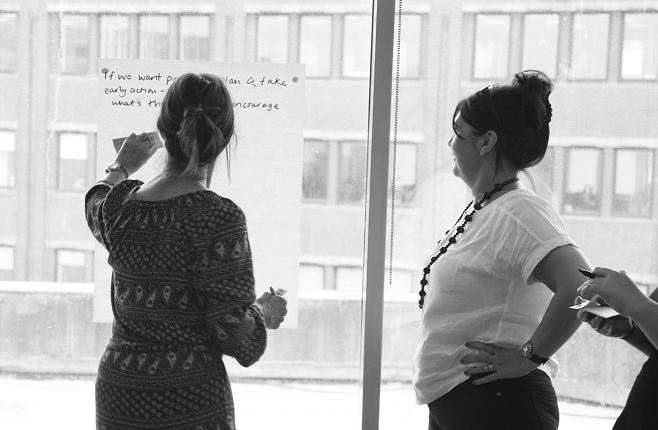Transitions in Later Life learning community: June 2018

Our June 2018 learning community meeting was held in Dublin, Ireland, hosted by Age & Opportunity.
Ageing stereotypes exercise led by Age & Opportunity
Ciaran and Brian gave everyone a random selection of word cards (e.g. crisis, spiritual, travel), to place face-down at either ‘middle age’, ‘older’ or ‘younger’. The words around each age group were revealed, leading to a discussion about language and stereotypes, and how these are important on a cultural and personal/internalised level.
We discussed needing a culture shift to thinking about a life course approach, instead of distinct categories such as ‘middle age’ that are neither real nor helpful.
Cognitive ageing and brain plasticity
Dr Sabina Brennan, a psychologist, cognitive neuroscientist and award-winning science communicator shared some of her work with the group on the theme of brain health and ageing. In summary:
- Cognitive decline is not an inevitable part of ageing
- The brain is plastic and can change, even in later life
- ‘Cognitive reserve’ offers protections against disease and decline
- It is possible and important to be proactive about brain health – developing your cognitive reserve e.g. through exercise and learning throughout life
Challenges and breakthroughs session
The group positioned themselves along a spectrum from challenges to breakthroughs, to represent their experience since the last community meeting, and we collectively discussed some of the challenges that had arisen – including a few that others had experienced before.
Train the trainer handbook
Cheshire and Wirral Partnership NHS Foundation Trust has produced a handbook for training trainers, that is given to each new trainer. They took us through it and briefly discussed their experience in training trainers, in particular about making sure that trainers are suitable to conduct the work and represent their course – an issue which has been raised before in learning community meetings. Manchester Mind use shadowing and pair-working for newly trained trainers to allow them to gain experience safely. All those trained by Workers’ Education Association will first undergo the course themselves to understand the impact and what may be brought up in a personal way.
Citizens Advice Looking Forward
Citizens Advice has become increasingly aware of the needs of people who are approaching later life. Because of this, it is in the process of conducting research to potentially inform the design of a new service. This involves ethnographic interviews and focus groups to create case studies of several people’s experiences/priorities/expectations throughout the UK (including some video case studies).
On the morning of day two, Allyson gave us an interim summary of the research so far and the group discussed potential services and how to encourage people to make use of services that are available.
Three Horizons visioning session
The group produced a Three Horizons map for the system surrounding the experience of transitioning into later life, and to envision the future that we would want in (perhaps) 10 years’ time.
Experiential session led by Manchester Mind
Ruth from Manchester Mind began and ended the session with a short, guided meditation. She introduced us to two exercises on social networks, including listing and drawing our personal relationships. A final exercise, ‘Who Am I?’ got us to think about ourselves and our identity, the many roles that we play and the many strengths and characteristics that we carry.
